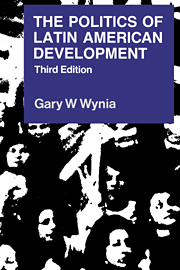Book contents
- Frontmatter
- Contents
- List of maps and tables
- Preface to the third edition
- Preface to the second edition
- Preface to the first edition
- Map 1 Latin America
- Map 2 Per capita gross domestic products 1987, measured in 1986 U.S. dollars. (Source: Inter-American Development Bank, Economic and Social Progress in Latin America, 1988, p. 540.)
- Part I Understanding Latin American politics
- Part II The political games played in Latin America
- 6 Mexico: Whose game is it?
- 7 Chile: democracy destroyed
- 8 Venezuela: democracy preserved
- 9 Brazil: populists, authoritarians, and democrats
- 10 Argentina: populists, authoritarians, and democrats
- 11 Cuba: a communist revolution
- 12 Nicaragua: revolution the Sandinista way
- Appendix: Tables
- Index
9 - Brazil: populists, authoritarians, and democrats
Published online by Cambridge University Press: 20 October 2009
- Frontmatter
- Contents
- List of maps and tables
- Preface to the third edition
- Preface to the second edition
- Preface to the first edition
- Map 1 Latin America
- Map 2 Per capita gross domestic products 1987, measured in 1986 U.S. dollars. (Source: Inter-American Development Bank, Economic and Social Progress in Latin America, 1988, p. 540.)
- Part I Understanding Latin American politics
- Part II The political games played in Latin America
- 6 Mexico: Whose game is it?
- 7 Chile: democracy destroyed
- 8 Venezuela: democracy preserved
- 9 Brazil: populists, authoritarians, and democrats
- 10 Argentina: populists, authoritarians, and democrats
- 11 Cuba: a communist revolution
- 12 Nicaragua: revolution the Sandinista way
- Appendix: Tables
- Index
Summary
It was once believed that underdevelopment was the cause of military dictatorship. Plagued by widespread poverty, illiteracy, and large rural populations, Latin American nations were thought to be natural breeding grounds for violence and military repression. But with their “modernization” this was supposed to end, since modern countries do not have military governments. Well, they did modernize, some countries industrializing and urbanizing even faster than anticipated, but military governments did not disappear. Instead, starting in 1964 they became more common than ever. Worse still, this time the armed forces took it upon themselves to govern as long as necessary to make fundamental changes in their nations' politics. Latin Americans had seen nothing like it before.
Why military authoritarianism?
Chronic disagreements over political rules are characteristic of the region's politics, as we have learned, as is military involvement in these disputes. But that fact alone cannot explain the new wave of military governments that swept the region in the 1960s and 1970s. Nor does it explain why officers believed that they could actually reconstruct their nations' political systems the way the Brazilians tried to do starting in 1964, the Argentines in 1966, the Peruvians in 1968, the Chileans and Uruguayans in 1973, and the Argentines for a second time in 1976.
No single condition or event accounts for the creation of these military authoritarian regimes, but two circumstances contributed a great deal to their invention, one of them economic and the other ideological.
- Type
- Chapter
- Information
- The Politics of Latin American Development , pp. 214 - 248Publisher: Cambridge University PressPrint publication year: 1990



